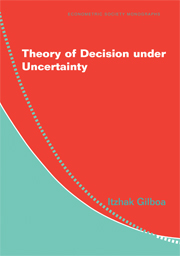Book contents
- Frontmatter
- Contents
- Preface
- I Intuitive Definitions
- II Behavioral Definitions
- 6 A Case Study
- 7 The Role of Theories
- 8 Von Neumann–Morgenstern's Theorem
- 9 De Finetti's Theorem
- 10 Savage's Theorem
- 11 The Definition of States
- 12 A Critique of Savage
- 13 Objectivity and Rationality
- 14 Anscombe–Aumann's Theorem
- III Alternative Behavioral Theories
- IV Cognitive Origins
- References
- Index
- Titles in the series
10 - Savage's Theorem
Published online by Cambridge University Press: 05 January 2013
- Frontmatter
- Contents
- Preface
- I Intuitive Definitions
- II Behavioral Definitions
- 6 A Case Study
- 7 The Role of Theories
- 8 Von Neumann–Morgenstern's Theorem
- 9 De Finetti's Theorem
- 10 Savage's Theorem
- 11 The Definition of States
- 12 A Critique of Savage
- 13 Objectivity and Rationality
- 14 Anscombe–Aumann's Theorem
- III Alternative Behavioral Theories
- IV Cognitive Origins
- References
- Index
- Titles in the series
Summary
BACKGROUND
de Finetti's theorem provides a definition of subjective probability, but it assumes additivity. This axiom is defensible if someone is risk neutral, expected utility maximizer whose payoff is measured in probabilities, or if, more generally, we know the utility function of the decision maker. In other words, if we have a utility function as a measurement tool, we can use it to measure subjective probabilities, as in the elicitation procedures described in Chapter 8. Mathematically, de Finetti's theorem was no more than a separating hyperplane argument – if we have a linear structure of payoffs, we use a duality theorem to obtain a measure on states.
The von Neumann–Morgenstern (vNM) theorem is almost completely symmetric. vNM assumed that probabilities are well defined and measured utility in terms of probability. Again, this is evident both in the elicitation procedures sketched in Chapter 8 and in the mathematical proof. The last proof of the theorem described in Section 8.3.3 was intended to highlight the fact that the vNM theorem is again a separating hyperplane argument. This time, a linear structure is given on the probability measures and the duality theorem helps us obtain numbers on the outcomes.
The two theorems are very elegant and powerful, but, taken together, they do not tell a complete story. von Neumann and Morgenstern tell us how to obtain utilities given probabilities, and de Finetti does the opposite – shows how to obtain probabilities given utilities.
- Type
- Chapter
- Information
- Theory of Decision under Uncertainty , pp. 94 - 112Publisher: Cambridge University PressPrint publication year: 2009



